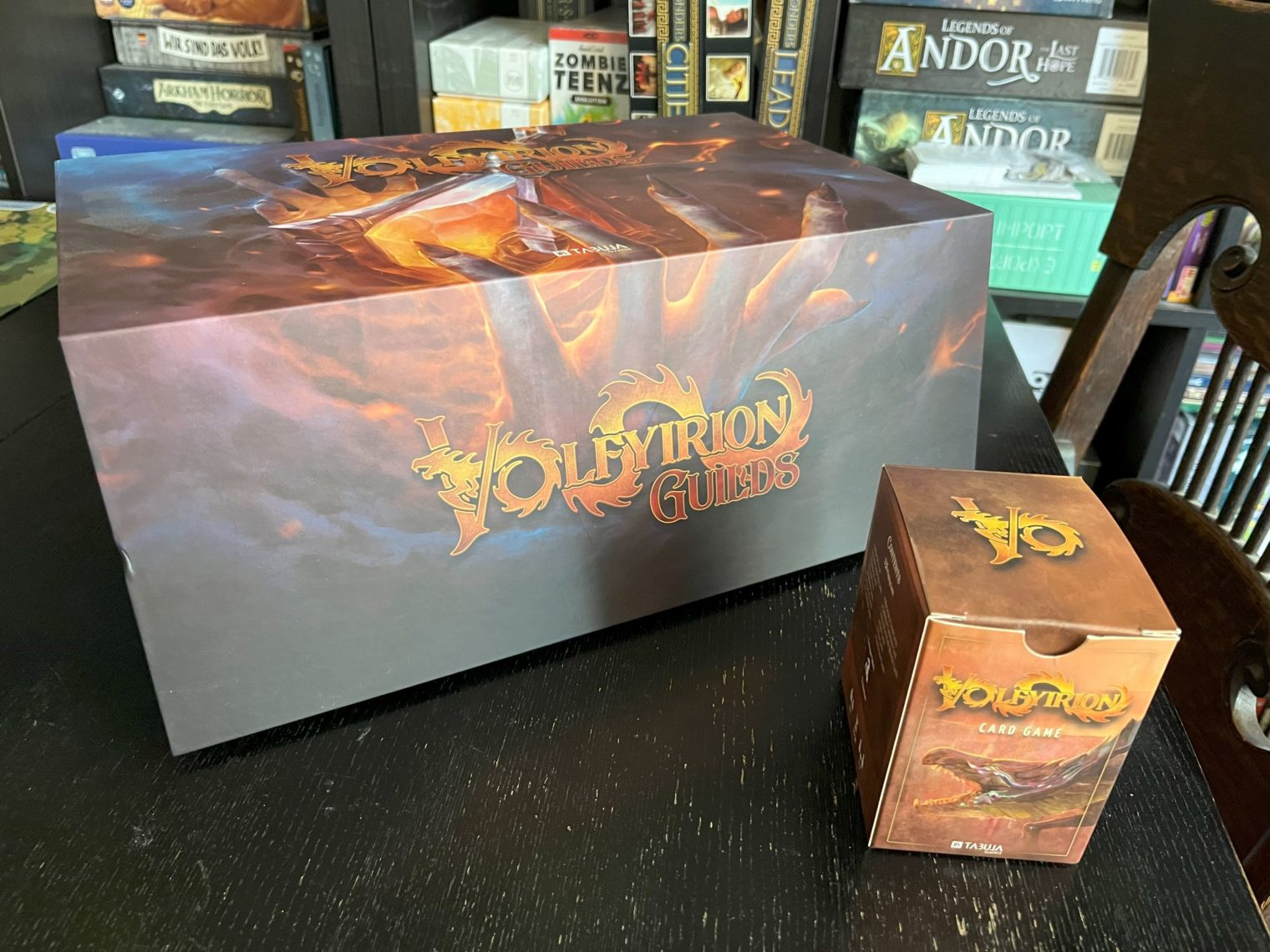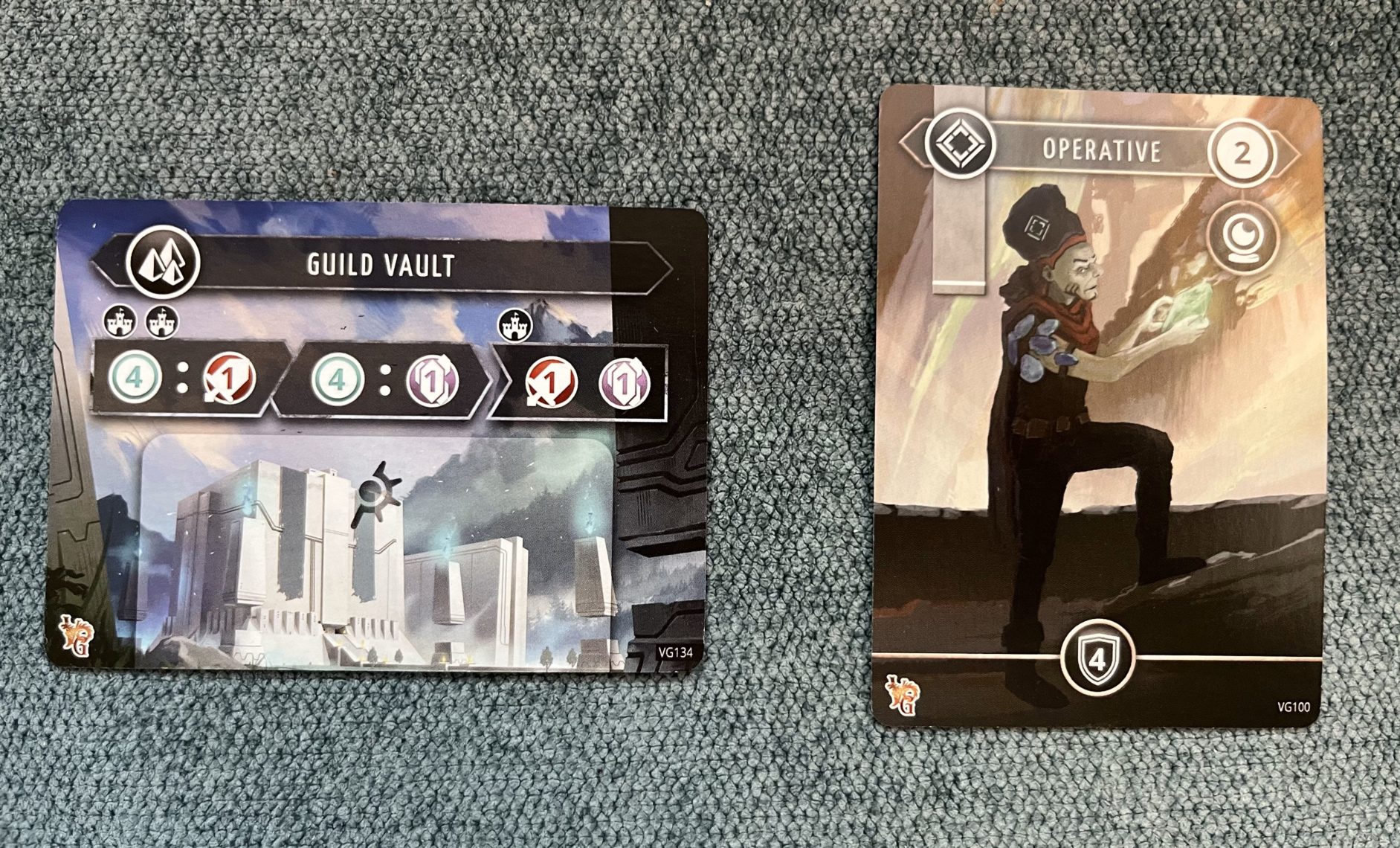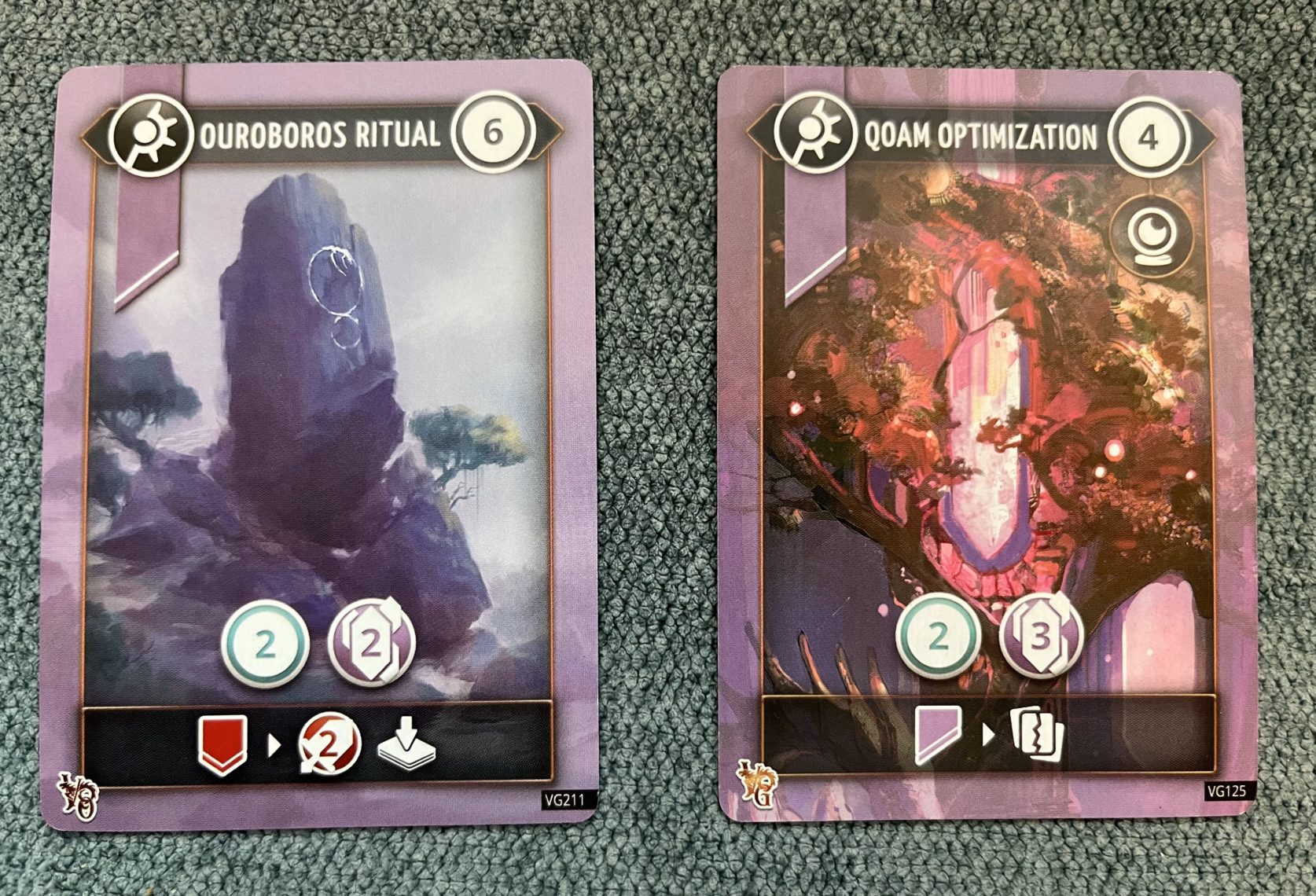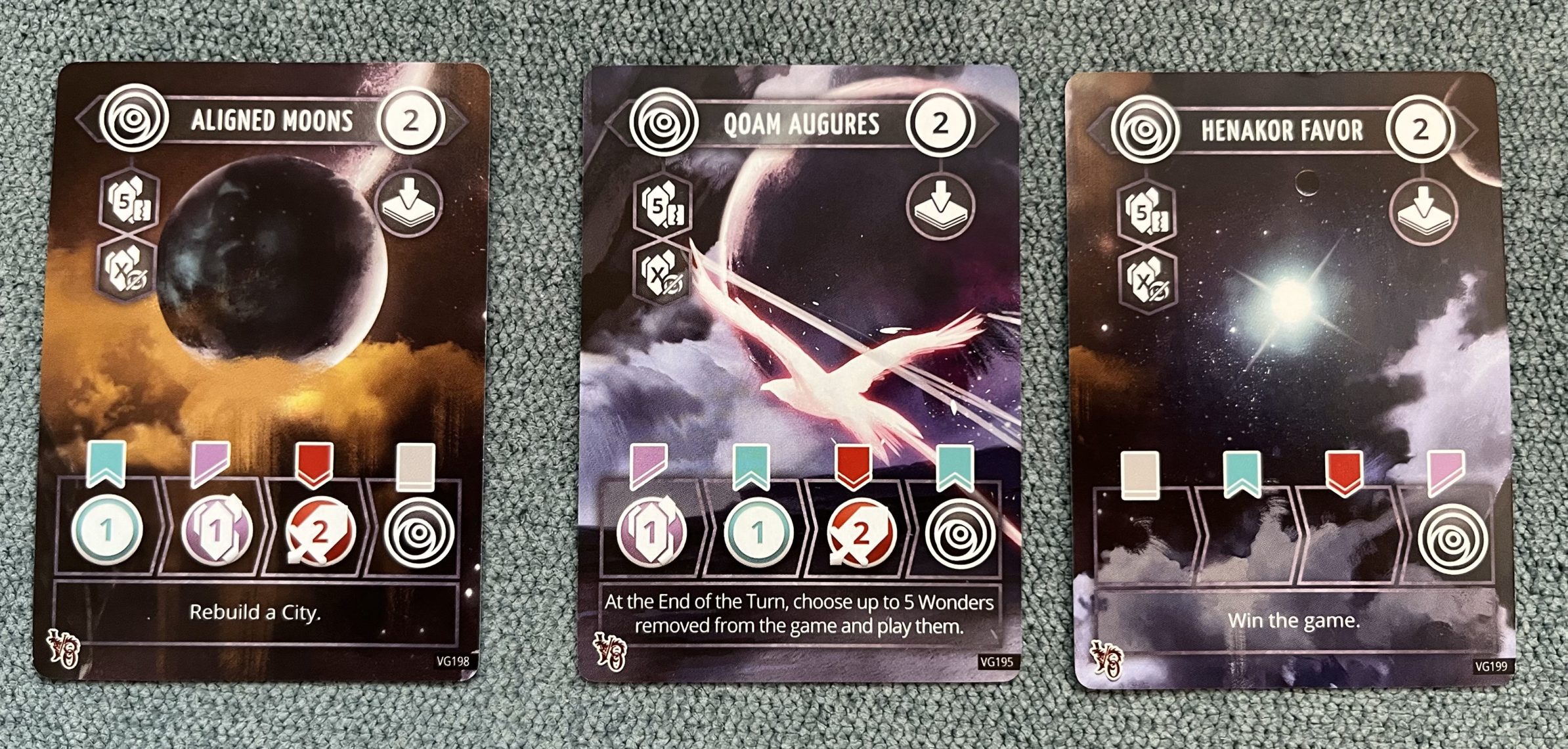Pity poor Tabula Games.
Almost exactly two years ago, on September 30, 2021, they contacted us asking if we’d be interested in reviewing one of their games. They’re an Italian publisher, and were looking to expand their North American presence.
So I checked out their catalogue on BGG. Decent-enough looking games, mainly fantasy-themed, solid ratings. So I answered, “Yeah, Volfyirion Guilds looks interesting and it’s coming out soon, how about that one? But if it’s a standalone sequel to Volfyirion, maybe send that one now so I can get a sense of what the sequel adds to the mix?”
I also made it clear that the DWP does not do Kickstarter previews (except for very special games) and we don’t do puff pieces–I sent them my Bonfire review so they’d see that not even the great Stefan Feld gets a free pass.
Tabula said, “Fine, no problem, we’ll send you Volfyirion now and Guilds when it comes out next year.” Soon enough the copy of Volfyirion arrived.

Since the COVID situation here in Toronto in fall of 2021 basically made in-person play unfeasible, all I could do was look over the rules, play the game two-handed against myself, and try the solo mode.
None of which knocked my socks off, truth be told. To me, Volfyirion was very similar to Star Realms or Ascension in that it was a deckbuilder with multiple currencies (Command Points, Battle Points, Knowledge Points), a conveyor-belt Asset Row of available cards, and faction synergies. There were three main differences:
One thing I quite liked was that there were lots of opportunities to thin your deck, including by acquiring Wonders. There were also a few extras thrown in like Perks which gave players asymmetric powers and Ploys which got played face-down and triggered at specific times à la Yu-Gi-Oh Trap cards.
All in all a decent enough game that worked and felt balanced–and yet my overall reaction was, “Meh.” It was fine. Nothing particularly compelling. The solo mode felt very dry.
Yet clearly Volfyirion has done well: it’s rated a 7+ on BGG and is Tabula’s second-highest-ranked game after Mythsea, which I haven’t played but looks like a fantasy-themed dudes-on-a-map game that I’m tempted to say looks very Blood-Rage-y.
So although I could have done a writeup of Volfyirion’s base game in the fall of 2021, I resolved to wait for Guilds in the hope that I would have more positive things to say, given it was being touted as having more varied and deeper gameplay.
And I waited. And I waited.
My “pledge” had been locked down in October, 2021, but after that, communication from Tabula dried up, and by the beginning of this year I began to assume the project had gone bust, as many had during the pandemic.
But then, in the middle of the summer of 2023, it arrived. Tabula had sent me a fully-backed KS pledge (original box included for scale):

Yikers! Just how much more was Guilds (all-in) adding into the mix? Turns out, both more and less than what the box promised.
To begin with, opening the box revealed sub-boxes for the Guilds retail box (a much humbler sizer), the four expansions, two booster-pack expansions, Solo-mode opponents, and nice’n’hefty card dividers. Also room to put your original Volfyirion deck box. Yet with all that, the box was deeper than it seemingly needed to be. Was there anything below the insert?
Turns out, nothing–except a drawer (accessible from the side) to store your play mats in (and also provide space to put all the backers’ names). Which is a feature I’ve never seen in a boardgame box before. Now, I’m a function-over-form kind of player when it comes to play-mats; if I’m going to be staring at one through a whole game I don’t want the admittedly-beautiful artwork to make it harder to actually, y’know, read the cards. But that’s me. I do appreciate the fact that Tabula incorporated the drawer for the kind of player who would probably go all-in. Know your market.
But what about Guilds? Is it just Volfyirion, but more? Thankfully, no. It is better. Much better. Turns out lead designer (and Tabula founder Alessandro Veracchi) has had some time to tinker, and by adding two straightforward mechanics he has turned Volfyirion into a much more interesting game.

The first addition is a new type of card–the Agent–which can be played to make cards in the Asset Row harder for your opponent to acquire (they have to defeat the Agent first before acquiring the card it’s guarding) plus, if your Agent’s strength is high enough, you can acquire the guarded card yourself for free on the following turn.
The second innovation is Vault Cards. Each player starts the game with their own Vault, which serves two purposes:
It’s instructive from a design standpoint to see how much two small changes like this can vastly improve the game experience. Giving players more control over Asset Row churn and providing additional mechanics to manipulate cards via the Vault really make Guilds a necessary upgrade to the Volfyirion experience.

Some of the new cards which use these new mechanics are just delightful. The Diplomat is my favorite. You buy it just to slip it into your opponent’s deck where it sits like an undigested meal. Your opponent then has to pray that they’ll acquire a card (like the new Thief Agent card) which lets them trash cards from their Vault, and thematically I love the idea of sealing some useless bureaucrat into an airless chamber and having an assassin garotte them.
Then there’s The Great Deal, which is super-expensive at 7 Command Points but oh so sweet if you have the right synergy because if it triggers you just pick up Volfyirion the Dragon (yup, they’re still in the game) and plop them onto your opponent’s city without having to pay the usual toll of 8 Knowledge. And you can do that every time that synergy pops up in your deck.
Not that the game is perfect. The rules are organized in a way that’s not intuitive to me–nothing that can’t be sorted out with some close reading, though. The only unanswered question I had was whether Sneak was mandatory when you acquired a card that had it (the answer according to the BGG forums was ‘yes’).
There was also at least one case where I thought the balance was a bit off among the cards:

Sure feels like the one on the right (from the base game) is better in almost all respects than the one on the left (from the Omens expansion) but it’s 2 Command Points cheaper.
Anyway, those are nits. Overall, the Guilds two-player experience is excellent even without the expansions–which I’ll get to in a moment–and the solo mode is vastly improved, with individual bosses that require different play styles and easy to implement–although maybe that’s just me, the feeling on BGG was that the solo rules were badly-written, I didn’t find that though.
There’s also a 2v2 team mode which I really want to try but haven’t been able to find three people interested in playing, more about that see below. Looks decent enough.
As for those expansions. Of the two booster-packs the Wonders pack is what it claims to be–twenty more Wonders to add to the pile, fine. The Mythsea Champions pack is only seven cards and can only be used with the Arbiters expansion, which adds unique player powers and Vaults and is definitely for advanced players only.
The one boxed expansion which isn’t as essential in my eyes is Shattered Times; it’s a tie-in with Tabula’s Shattered City RPG and just adds cards, no new mechanics. The other two–Ploys and Omens–on the other hand, definitely bring new things into the mix. Ploys is less interesting to me, in that it adds what are basically a bunch more traps that had been included in the original base game but were no longer part of the Volfyirion experience. If you don’t like surprises, don’t play with Ploys.

Omens, on the other hand, adds (no surprise) Omens Cards, which you play in front of you and level up by adding Signs to them by purchasing cards from the Asset Row and tucking them underneath. As you add Signs your Omens trigger bigger and better rewards, and if you manage to power one up fully you unleash a really OP effect, one of which literally wins you the game:
(You can always remove that one if cards like that bug you.)
But don’t worry. you can spend Knowledge Points to de-Sign and even remove an opponent’s Omen. This expansion definitely makes acquiring Knowledge more important.
So, in summary: Volfyirion Guilds definitely delivers on its promise. Even the base game alone stand out to me as one of the better head-to-head deckbuilders out there, and the expansions add a huge amount of replayability and depth.

BUT.
Whether you need Volfyirion Guilds really depends on what else in your collection. Does it “kill” Netrunner? Or Epic? Or Shards of Infinity? No, it doesn’t have the compelling theme and story of a Netrunner or the hilarious swinginess of an Epic or the superb tactics and pacing of a Shards. If you’re already all snuggled in with one of those (or any one of umpteen other ones out there) I don’t think you need Guilds. You should definitely play it at some point, for sure.But as good as Guilds is, it suffers from the problem of being “just another one”. And I hate saying that. Because a lot of sweat and love went into the making of it. It deserves better. But that’s why I started this by saying, “Pity poor Tabula Games”: because the deckbuilding party room is already really, really crowded, and being “very good” just isn’t enough any more.
Thanks to Tabula Games for providing a review copy of Volfyirion: Guilds for this article.
Comments
No comments yet! Be the first!